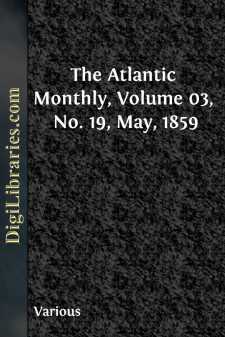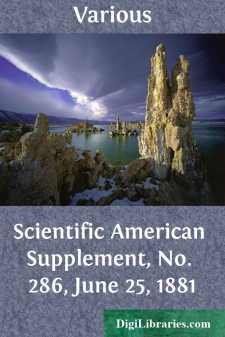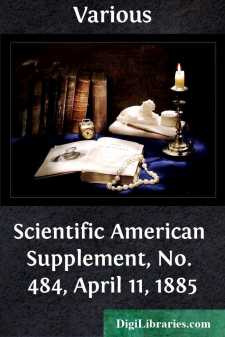Categories
- Antiques & Collectibles 13
- Architecture 36
- Art 48
- Bibles 22
- Biography & Autobiography 813
- Body, Mind & Spirit 141
- Business & Economics 28
- Children's Books 12
- Children's Fiction 9
- Computers 4
- Cooking 94
- Crafts & Hobbies 4
- Drama 346
- Education 46
- Family & Relationships 57
- Fiction 11826
- Games 19
- Gardening 17
- Health & Fitness 34
- History 1377
- House & Home 1
- Humor 147
- Juvenile Fiction 1873
- Juvenile Nonfiction 202
- Language Arts & Disciplines 88
- Law 16
- Literary Collections 686
- Literary Criticism 179
- Mathematics 13
- Medical 41
- Music 40
- Nature 179
- Non-Classifiable 1768
- Performing Arts 7
- Periodicals 1453
- Philosophy 64
- Photography 2
- Poetry 896
- Political Science 203
- Psychology 42
- Reference 154
- Religion 513
- Science 126
- Self-Help 83
- Social Science 81
- Sports & Recreation 34
- Study Aids 3
- Technology & Engineering 59
- Transportation 23
- Travel 463
- True Crime 29
Blackwood's Edinburgh Magazine - Volume 55, No. 339, January, 1844
by: Various
Description:
Excerpt
STATE PROSECUTIONS.
The Englishman who, however well inclined to defer to the wisdom "of former ages," should throw a glance at the stern realities of the past, as connected with the history of his country, will be little disposed to yield an implicit assent to the opinions or assertions of those, who maintain the superiority of the past, to the disparagement and depreciation of the present times. Maxims and sayings of this tendency have undoubtedly prevailed from periods of remote antiquity. The wise monarch of the Jewish nation even forbade his people to ask "the cause that the former days were better than these;" "for," he adds, "thou dost not enquire wisely concerning this." Far different would be the modern precept of a British monarch. Rather let the English subject "enquire diligently concerning this," for he cannot fail to enquire wisely. Let him enquire, and he will find that "the former days" of England were days of discord, tyranny, and oppression; days when an Empson and a Dudley could harass the honest and well-disposed, through the medium of the process of the odious star-chamber; when the crown was possessed of almost arbitrary power, and when the liberty and personal independence of individuals were in no way considered or regarded; days when the severity of our criminal laws drew down from a French philosopher the sneer, that a history of England was a history of the executioner; when the doomed were sent out of the world in bands of twenty, and even thirty, at a time, at Tyburn or at "Execution dock;" and when, in the then unhealthy tone of public morals, criminals famous for their deeds of violence and rapine, were regarded rather as the heroes of romance, than as the pests and scourges of society. Let him enquire, and he will find that all these things have now long since passed away; that the rigours of the criminal law have been entirely mitigated, and that the great charters of our liberties, the fruits of accumulated wisdom and experience, have now been long confirmed. These facts, if universally known and duly pondered over, would go far to banish discontent and disaffection, and would tend to produce a well-founded confidence in the inherent power of adaptation to the necessities of the people, possessed by the constitution of our country. Thus, the social wants of the outer man having been in a great measure supplied, the philanthropy of modern times has been chiefly employed on the mental and moral improvement of the species; the wants of the inner man are now the objects of universal attention, and education has become the great necessity of the age. Hitherto, the municipal laws and institutions of this country have been defective; inasmuch as they have made little or no provision for the adequate instruction of the people. Much, no doubt, has been already done, and education, even now, diffuses her benignant light over a large portion of the population; among whom, the children of the ignorant are able to instruct their parents, and impart, to those who gave them being, a share in the new-found blessing of modern times....












